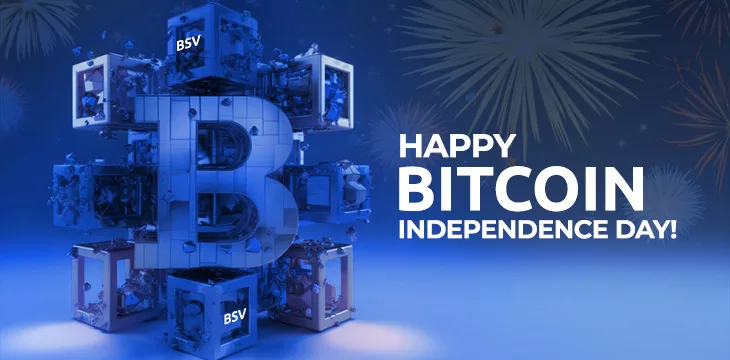|
Getting your Trinity Audio player ready...
|
November 15 is Bitcoin Independence Day, the day we celebrate the beginning of the return to Satoshi’s original design.
Bitcoin Independence Day should not be confused with BSV’s birthday—that goes all the way back to January 2009 when Satoshi released Bitcoin. Sure, the ticker has changed, but the BSV transaction history goes back to the start in the genesis block, and the original design is clear for all to see.
Instead, Bitcoin Independence Day represents the day when BSV developers and those who believe in unbounded, infinitely scalable Bitcoin said ‘no more!’ and began the long and laborious journey of restoring Bitcoin.
Since then, endless magic has happened. The original Bitcoin protocol has been restored, block sizes have kept increasing with demand, days with over 120 million transactions have occurred, and an ever-growing ecosystem of apps fueled by micropayments has emerged and evolved.
Why is Satoshi’s original design important?
Some readers might wonder why Satoshi’s original design is important. Hasn’t Bitcoin evolved since then? Well, until Independence Day 2018, it had done quite the opposite—it had devolved into something unrecognizable with tiny blocks, high fees, hardly any op codes and a pathetically limited transaction capacity.
Satoshi’s original design restores Bitcoin’s original capabilities including the original op codes which were removed by BTC Core developers. It enables peer-to-peer micropayments at scale, allows unbounded on-chain scaling, makes all kinds of interesting transactions possible, and makes on-chain data storage possible.
Like all well-meaning idiots, the BTC Core developers who thought they knew better destroyed Bitcoin’s original capabilities one update at a time. After Independence Day on November 15, 2018, hardworking BSV blockchain developers set about undoing the mess they had made.
After years of work, the original Bitcoin has been restored. Once again, amazing applications that use Bitcoin’s micropayment capability have emerged. User-friendly wallets like HandCash enable games like Champions TCG and social media apps like Bitchat Nitro, my2cents, LaMint, and Twetch. Next-generation cybersecurity tools like Sentinel Node showcase what the BSV blockchain can be used for, harnessing the power of the original Bitcoin to deliver game-changing solutions and massive value.
None of this would have been possible without the decision by BSV blockchain developers to draw a line in the sand and put in the work to restore Bitcoin. It’s exciting to think what might happen over the coming years as more developers enter the BSV ecosystem as the on-chain economy catches on and BTC’s unfixable limitations smother innovation and progress.
Don’t forget to subscribe to CoinGeek for all the latest updates on Bitcoin’s development, the new generation of apps that get built on it, and the COPA v Wright trial itself!

 12-26-2025
12-26-2025 




